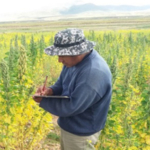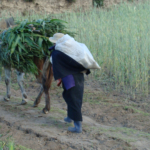


University of Missouri - Columbia
UMSA
Bolivia
2/2016—2/2019
Intensifying knowledge is the centerpiece of Agroecological Intensification. This requires a dialogue between local and global cropping system knowledge to generate innovation and adaptation in continually shifting contexts. This project relates to adaptation by linking agricultural planning with local knowledge; specifically, how farming decisions are made based on local perceptions and information on climate. Local knowledge is also a known source of resilience and this project is consistent with this finding. It increases the sustainability of smallholder farming by promoting an intergenerational dialogue about the utility of local knowledge. In so doing, the culture is kept up-to-date and dynamic, as debate and dialogue allows knowledge reconfiguration that’s responsive to current processes and developments. Furthermore, promoting the interrelation of local and global knowledge is a step towards egalitarian relations between different types of knowledge with potentially important implications for intercultural relations, transdisciplinarity, and meaningful collaboration. This project will increase the region’s and program’s understanding of how research networks function, specifically in terms of how relatively small groups of farmer-researchers interact and share knowledge with the rest of their community.
The overall goal of this project is to establish and evaluate an integrated climate planning tool based on local knowledge and scientific knowledge to help farmers make agricultural planning decisions based on improved forecasting tools used to predict short and medium term meteorological conditions. The purpose of these tools is to reduce the vulnerability of smallholders to climate variability and change. The specific objectives are:1. Develop and implement a system of early warning that would combine local and technological knowledge for the Bolivian higher Andes. 2. Evaluate the contributions made to producer well-being by agricultural planning based on local knowledge and farmer-researcher networks. This will be evaluated both in terms of short term benefits and in terms of the long term sustainability of adaptation decisions. 3. Develop and evaluate methods of dissemination of local and regional forecast knowledge to younger producers and stakeholders.
Historical data from 16 Altiplano weather stations from 1980 to 2017 were analyzed to identify trends in weather and climate. In general the onset of rains during the last 10 years, has been later. While the date has varied by location, the rains have come roughly one month later than they did 20-30 years ago. At the same time, annual rainfall has not changed meaning that more intense rains are falling in a shorter period. These results are coincide with the perceptions of farmers in 8 communities in the region. Eight farmers expert in traditional forecasting methods across the Altiplano wanted to research frost behavior using data from a station in the Patacamaya community. Traditionally farmers predict frost by observing cloud cover—the clearer the skies the higher probability of frost. Meteorological data from the 1980-2014 period comparing precipitation (cloud cover) and frost confirmed farmer practices. However, beginning in 2014 dynamic changes were observed and the correlation between long dry periods and frost was not observed. This may be due to rising temperatures and CO2 levels which have replaced the buffering effect of water vapor. During this same period, frosts also occurred when they were not expected by farmers or meteorologists. An in-depth analysis of one such event, showed that frost was due to rapid changes in the global circulation of winds that rapidly pushed clouds away—something that neither traditional knowledge nor conventional meteorology can forecast accurately to date.

